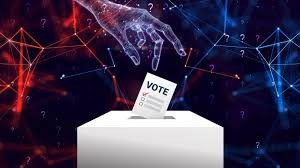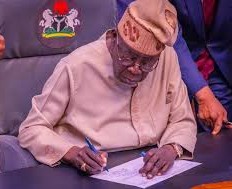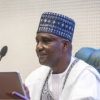As Nigeria prepares for the 2027 general elections, key stakeholders and politicians are actively debating electoral law reforms. Recent months have seen various meetings and constitutional hearings proposing solutions to improve upon the 2023 polls. One of the most debated aspects of electoral reform is the potential inclusion of artificial intelligence (AI) within Nigeria’s electoral
As Nigeria prepares for the 2027 general elections, key stakeholders and politicians are actively debating electoral law reforms. Recent months have seen various meetings and constitutional hearings proposing solutions to improve upon the 2023 polls.
One of the most debated aspects of electoral reform is the potential inclusion of artificial intelligence (AI) within Nigeria’s electoral system. The challenge of integrating AI builds on recent experiences with technology in Nigerian elections, notably the introduction of the Bimodal Voter Accreditation System (BVAS) and the IReV result portal during the 2023 general election, which ultimately did not significantly alter the narrative surrounding electoral outcomes.
Concerns about the 2023 general elections have led Nigerians to consider alternatives for improving the 2027 polls. Policymakers are now assessing both the potential benefits and risks of using AI to enhance transparency in future elections.
Nigeria Electioneering Process and Technology
The integration of technology into Nigeria’s electoral process has been ongoing since 1999. The Independent National Electoral Commission (INEC) has introduced various technological measures in preparation for elections. For instance, INEC has utilised technology for tasks such as managing nomination processes, monitoring election materials, accrediting voters, and transmitting results.
The electoral commission has previously stated that technology can be more effective and efficient than human involvement. INEC has also indicated that reducing human participation in certain activities could decrease interference and potentially increase the transparency and credibility of the election process.
Since 1999, the electoral commission has introduced various forms of technology. Initially, INEC set up a computer room within its research department, which was later renamed the Communication and Information Technology (C & IT) unit. This unit was eventually upgraded to a department, leading to the development of electronic registers using optimal mark recognition (OMR). In 2005 and 2006, the commission adopted the Direct Data Capture device to support voter registration for the 2007 elections. The Direct Data Capture Machine (DDCM) was used for the 2011 elections.
Before the 2015 general elections, the electoral commission introduced smart card readers to verify voters’ fingerprints and identities at polling stations. Later, these were replaced by the BVAS system for voter verification before voting.
In 2021, the commission introduced the INEC Voter Enrolment Device (IVED) to prevent voter identity fraud. IVED enhanced data quality by switching from fingerprint-only verification to both fingerprint and facial biometrics.
Before the 2023 election, INEC introduced the Result Viewing Portal (IReV) to boost transparency by posting polling unit results online in real time. This new technology marked a major change in Nigeria’s electoral process.
Although widely regarded as a significant milestone for technological integration within Nigeria’s electoral process, the 2023 election received criticism due to post-election developments. The electoral commission reported technical challenges and delays in uploading presidential results on election night, which prompted concerns regarding the reliability of the nation’s electoral system and diminished public confidence in the application of technology.
Consequently, stakeholders, politicians, citizens, and both international and local observer missions expressed concerns and recommended clearer procedures and improved infrastructure before future elections. INEC has stated its intention to implement reforms aimed at enhancing logistics, transmission systems, and transparency measures.
There have been ongoing discussions regarding the potential for AI to enhance accountability and transparency in the electoral process. Additionally, questions have been raised about the electoral commission’s capacity to address Nigeria’s electoral issues and whether it possesses the required infrastructure to implement AI in the upcoming election.
AI and the Electoral System: An Examination of Common Perceptions and Facts
AI is a branch of science focused on creating computers and machines that can perform tasks requiring human intelligence, such as problem-solving, decision-making, and pattern recognition based on human input, especially when handling data too complex for humans to analyse.
AI is a flexible technology that has been utilised across various sectors, including the election process. It has been recognised for its potential to improve efficiency in modern applications. Some experts indicate that AI may be suitable for certain aspects of electioneering, provided it is adapted to meet the particular requirements of those activities.
However, as artificial intelligence primarily operates by emulating human instructions, it relies heavily on the data provided to it and cannot function autonomously. Consequently, AI systems can adapt their behaviour and pursue specific objectives, often through learning from experience rather than explicit programming for each scenario.
AI operates strictly within human-set boundaries and, despite misconceptions, is not omnipotent. It cannot substitute for human interaction or independently reform practices like Nigerian electioneering without human involvement.
Potential Applications of Artificial Intelligence within the National Electoral System
There is clear potential for artificial intelligence (AI) to support the Nigerian electoral system, especially in specific domains. These areas are vital to ensuring the integrity of Nigeria’s elections, which currently face significant challenges to their stability.
Former National Commissioner of the Independent National Electoral Commission (INEC), Mr. Festus Okoye, identified several key areas where artificial intelligence (AI) could be applied to address issues in Nigerian elections in his publication “Tackling Nigeria’s Electoral Challenges Utilising AI.” He stated that adopting new technology may help manage electoral challenges in the country.
Mr Okoye stated that the electoral commission may use AI for voter registration and identity verification, noting that the technology can help eliminate multiple and duplicate registrants. He explained that AI-based facial recognition, fingerprint scanning, and iris detection have the potential to reduce duplicate or fraudulent registrations.
“AI can assist in automating responses to voter inquiries, helping citizens check their registration status, and providing information on voting processes through Natural Language Processing (NLP). Cognito and Clearview AI are digital identity verification systems that use AI to validate user identity in real-time, through facial recognition, document scanning, and other biometric data. It could help ensure that only eligible voters are registered.”
The former INEC commissioner, a lawyer, explained that the AI-based Bimodal Voter Accreditation System (BVAS) extends beyond registration. He noted that adding facial technology to Nigeria’s voting system has enhanced its authenticity. He suggested INEC could use AI in elections and add iris recognition to BVAS for greater transparency.
AI technology can also be applied in managing challenges related to misinformation during election periods. As false information spreads rapidly through platforms like social media and AI tools, AI may play a role in addressing and identifying information disorder.
Electoral misinformation undermines the electoral commission’s efforts and remains a significant challenge, despite countermeasures. INEC is struggling to address the spread of fake news and should use AI tools to monitor and reduce misinformation during elections.
Additionally, artificial intelligence may be utilised to enhance election planning within the country, particularly in optimising logistics distribution. A major criticism directed at INEC concerns its inefficiency in distributing materials nationwide; by leveraging AI, it is possible to simulate and analyse optimal allocation of logistics to ensure that resources are delivered effectively to the areas where they are most needed.
AI chatbots can answer voter questions in multiple Nigerian languages, improving access to election information. This helps facilitate communication between citizens and the electoral commission, bridging long-standing gaps.
INEC can use AI to monitor voting and security, quickly detecting violations of electoral laws and enabling prompt action. AI can also track voting patterns, aiding electoral planning.
Electoral Legislation and Artificial Intelligence
The integration of technological innovation into the electoral system is addressed in the Electoral Act 2022. Although the legislation does not explicitly reference artificial intelligence for election purposes, it contains provisions that permit the use of technology. The application of the law should be approached with careful consideration.
For example, Section 41(1) of the Electoral Act addresses voting devices, while Section 47 pertains to the use of technology for voter verification and confirmation at polling units.
Article 3 of Section 47 reads, “Where a smart card reader or any other technological device deployed for accreditation of voters fails to function in any unit and a fresh card reader or technological device is not deployed, the election in that unit shall be cancelled and another election shall be scheduled within 24 hours if the Commission is satisfied that the result of the election in that polling unit will substantially affect the final result of the whole election and declaration of a winner in the constituency concern.”
The Electoral Act 2022 supports technology-driven elections by allowing electronic accreditation, transmission, and collation within statutory law, and this could include AI.
The use of AI in all sectors presents challenges that could impede its role in improving elections in Nigeria without proper legislation. Instead of solving trust issues, AI may worsen them if compliance is not enforced. Certain challenges relate to infrastructure and data development. Nigeria has limited long-term internet infrastructure, which impacts the optimal performance of some advanced AI tools.
Should AI Be Used in Nigeria’s Electoral System?
“The incorporation of AI into the electoral process is very critical for our democracy ahead of the 2027 elections. We can highlight several opportunities, likewise a few associated risks,” Akinkunmi Oludiran, a Data Analyst at Budgit Artificial Intelligence desk, opined.
He stated that while AI can streamline election processes, it also risks diminishing human involvement in politics. GenAI tools like multilingual chatbots can improve voter education and access, and predictive models help with staff allocation, route planning, and identifying potential risks during elections. “AI rapid fact-checking workflows and authentic media verifiers can significantly reduce mis/disinformation”.
While AI applications offer several advantages, certain critical risks—such as data sprawl and inadequate vendor security—may lead to the creation of fraudulent records or outcomes. “Additional risks associated with AI include the micro-targeting of voters,” he added.
Jide Alawode, a technology expert specialising in governance and democracy, also expressed support for integrating AI into Nigeria’s electoral system, noting its potential to enhance trust in the election process within the country.
“It could also be used during an election to analyse real-time data to detect statistical anomalies or disruption, thereby alerting nearby security and electoral officials for quicker response. The most crucial part of the AI that can be used to implement is the result collation. The use of an AI algorithm to aggregate results directly from source documents right from the polling units will minimise human error and opportunity for malicious manipulation at the transmission stage, thereby increasing public trust in the final result”, he said.
Mr Alawode noted that the effectiveness of AI in promoting electoral integrity depends largely on the environment in which it is used. He explained that if election coordination lacks integrity, AI may not be able to contribute successfully to transparent elections.
“The primary concern is not the technology itself, but the environment it operates in. AI is only as unbiased as the data it is trained on; if trained on flawed historical data, it could reinforce existing biases.
“The greatest danger, recall that in the last general election where results were transmitted into INEC’s central server, there was a claim that the server was hacked. A poorly implemented or hacked AI system could centralise electoral fraud to an unprecedented and undetectable level.
“Without absolute transparency in the algorithms and strong legal frameworks to govern their use, an AI-powered election could create a crisis of legitimacy far worse than the chaos it was meant to solve. The foundation must be solid infrastructure, reliable power, and unwavering political will for transparency before AI is introduced.”
David Adeleke, a Cohort of the Centre for Journalism Innovation and Development (CJID), called for early deployment of the AI before the year of the election to clear off the doubt and other human biases that can taint the electioneering system.
Mr Adeleke urged careful adoption of AI in Nigeria’s elections, noting it won’t solve all problems but can improve transparency and efficiency. He recommends piloting AI in logistics or voter education, ensuring robust legal and ethical standards, and maintaining openness to build public trust. Responsible use of AI could greatly enhance election credibility and efficiency.



















